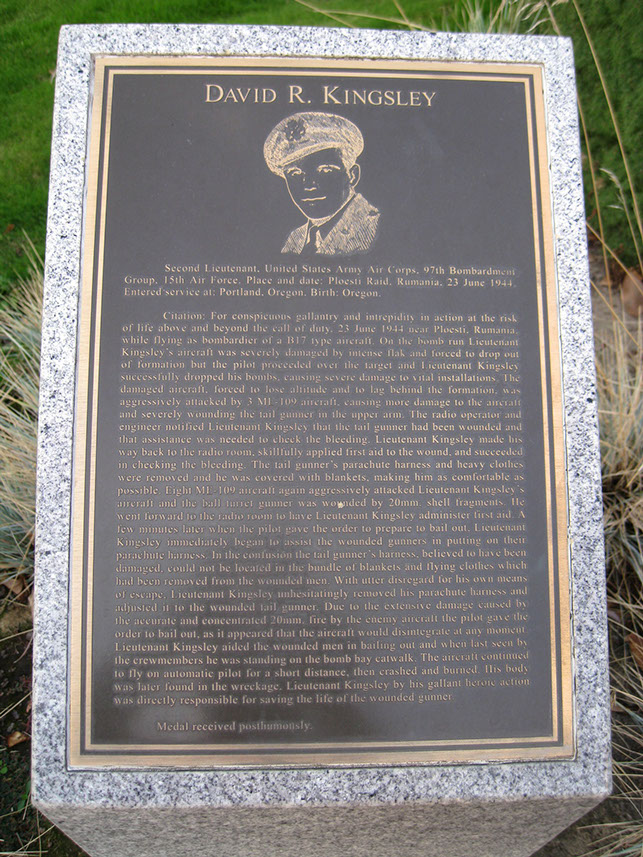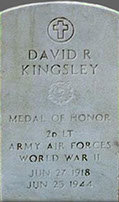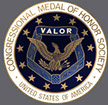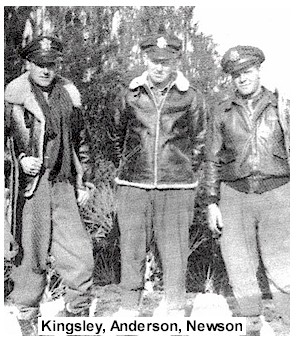
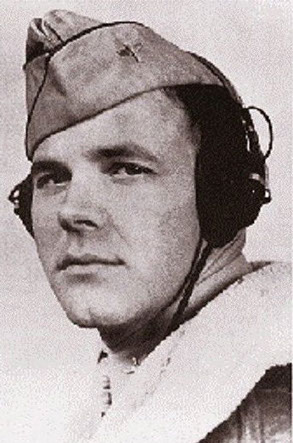
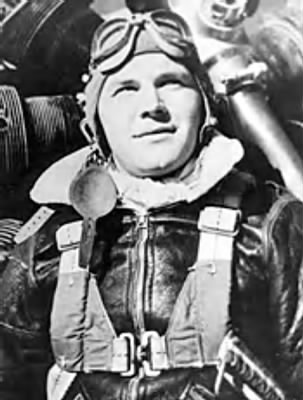
David Richard Kingsley was born in Portland, Oregon, June 27, 1918, grew up on S.W. Montgomery Street and attended St. Michael's school. He was a firefighter before the war, Kingsley joined the Army Air Forces from Portland, Oregon in April 1942, and by June 23, 1944 was a second lieutenant serving as a bombardier in the 97th Bombardment Group, Fifteenth Air Force.
Kingsley earned the Medal of Honor, as recognition for his courage and selfless sacrifice during a raid into Romania on June 23, 1944, where he served as a bombadier on a B-17. During the mission the aircraft was badly damaged by enemy fire and forced to drop out of the formation. The pilot continued on to the target, the Ploesti Oil Fields, and there he dropped his bombs, severely damaging the installation. The aircraft was unable to keep up with the formation on the return trip and was attacked by enemy aircraft, during which the plane was further damaged and the tail gunner badly wounded. Kingsley gave aid to the gunner and then went to give aid to the ball gunner who had also been wounded. The pilot gave the order to bail out but Kingsley found that the tail gunner's parachute was missing. He placed his own chute on the wounded man and then he helped the wounded men bail out of the burning plane. The last sight of him was as he stood on the bomb bay catwalk while the plane flew on auto pilot until it crashed a few minutes later. 2d Lt. Kingsley by his gallant heroic action was directly responsible for saving the life of the wounded gunner.
On May 4, 1945, at a ceremony held in St. Michael the Archangel church, our nation officially honored the heroism of the late David R. Kingsley, by presenting to him posthumously the Congressional Medal of Honor. Kingsley, had been a parishioner. For extreme courage and selfless sacrifice, he was posthumously awarded the Medal of Honor on April 9, 1945.
Kingsley Air Force Base in Klamath Falls is named after him.
His body was subsequently located and returned to the U.S. where it was buried in Section 34 of Arlington National Cemetery.
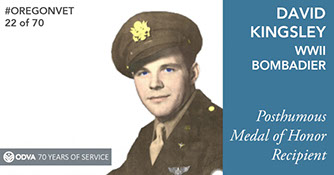
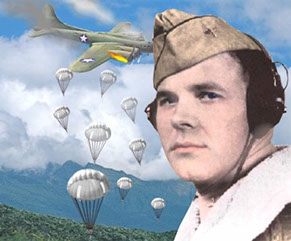
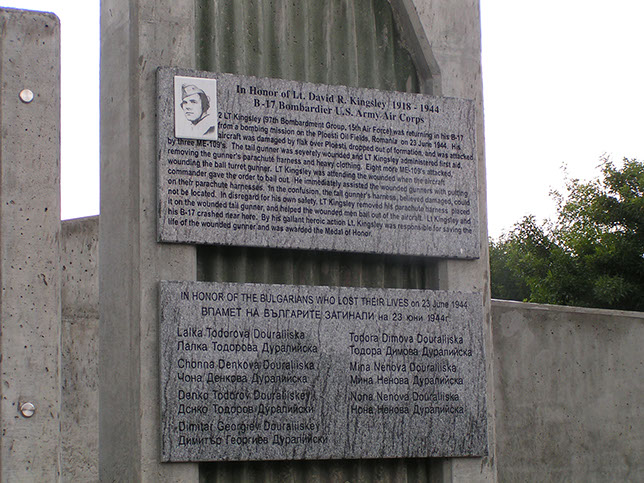
A memorial to David Kingsley and Suhozem victims was built in Suhozem, Bulgaria, near the crash site of his B-17. When Kingsley's plane crashed it killed a family of seven on the ground. The memorial was dedicated on 23 October 2004 and was built using a part of his plane in the memorial. Kingsley sister Phyllis Kingsley Rolison was at the dedication as was friends of the family killed when Kingsley's plane crashed.
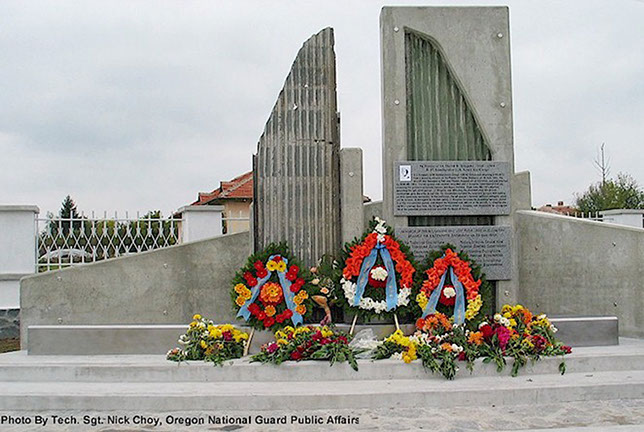
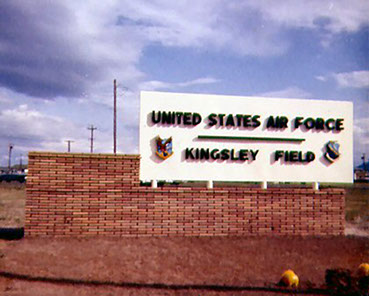
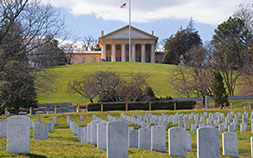

Birth: Jun. 27, 1918, Portland, Oregon
Death: Jun. 23, 1944, Bulgaria
Rank: Second Lieutenant
Unit: 341st Bombardment Squadron, 97th Heavy Bombardment Group
Awards: Medal of Honor
Burial:
Arlington National Cemetery
Arlington, Virginia, USA
Plot: Section 34 Lot 4786
Family links:
Parents:
David Ross Kingsley (1891 - 1928)
Angelina (Ann) Rutto Kingsley (1896 - 1939)
married at St. Michael the Archangel Church, Portland, Oregon in 1915
Siblings:
David Richard Kingsley (1918 - 1944)
*Phyllis Marie Kingsley Rolison (1926 - 2013)
*Margaret Mary Kingsley (1928 - 2010)
*Calculated relationship
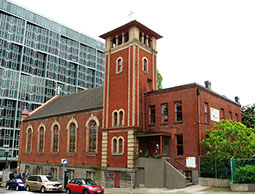
St. Michael the Archangel Church
Portland, Oregon
DAVID R KINGSLEY FOUNDATION
211 Arnold Ave, Ste 4
Klamath Falls, OR 97603
PO Box 8073
Klamath Falls, Oregon 97602
EIN 93-1270010
David R. Kingsley Triathalon
Kingsley Field in Klamath Falls, Oregon was named in honor of Kingsley's sacrifice.
A Rather Special Award
By John L. Frisbee, Contributing Editor, Air Force Association magazine
As the crippled B-17 neared its end, 2d Lt. David Kingsley faced a decision that would be immutable.
Ploesti always will be a symbol of surpassing valor in air warfare. More Medals of Honor--seven in all--were awarded for extraordinary heroism over that Romanian city than for great deeds performed at any other USAAF target of World War II.
The Ploesti area was said to be the third most heavily defended in the European theater, and for good reason. Oil fields and refineries in and around the city provided from one quarter to one third of the petroleum used by Hitler's armed forces and industry.
The first large-scale (five B-24 groups) USAAF attack on Ploesti was on Aug. 1, 1943. An estimated 40 percent of refining capacity was put out of service, but at a terrible cost of men and planes. USAAF was not able to follow up decisively because of other commitments, including support of the imminent invasion of Italy. Ploesti was soon back on line.
Fifteenth Air Force raids were considerably larger than the attack of August 1943. On June 23, 1944, in one of its major strikes, the Fifteenth sent 761 bombers to Romanian oil targets. In the nose of one 97th Bombardment Group B-17 was bombardier 2d Lt. David R. Kingsley, four days short of his 26th birthday. This was his 20th combat mission, but not his first to Ploesti, where the flak was intense, German fighter pilots tenacious, and targets usually obscured by smoke generators. It would be his job to put the B-17s bomb load on an oil storage facility at Giurgiu, about 70 miles south of Ploesti.
As the bomber stream approached the city, the 97th Group broke off and headed for Giurgiu, which, not unexpectedly, was shrouded by smoke. On the bomb run, Kingsley's B-17 was knocked out of formation by flak hits, but was able to proceed alone to bomb its target. Unable to hold altitude, the damaged bomber fell behind its formation. The straggler was attacked viciously by three Me-109s, which further damaged the bomber and severely wounded the tail gunner. Kingsley was called to the radio compartment to administer first aid. He removed the wounded man's damaged parachute harness and flight clothing, managed to check the bleeding, and did what he could to alleviate the gunner's suffering.
Could the B-17, torn by flak and raked by the Me-109s' 20-mm fire, make the 500-mile flight over Yugoslavia's 8,000-foot mountains to its base at Amendola, Italy? That question was answered as eight Me-109s bored in on the faltering bomber, wounding the ball turret gunner. With the B-17 now barely controllable--and apparently about to break up, the pilot ordered his crew to prepare for bailout.
Kingsley immediately began helping the wounded crewmen into their parachute harnesses, but the tailgunner's damaged harness could not be found in the welter of debris and blood-soaked clothing and blankets. Kingsley faced a fateful decision: Should he save himself by abandoning the wounded gunner, or give the man his chute harness at the cost of his own life? Kingsley chose the latter, fitting his harness to the injured man. Moments later, on the order to jump, Lieutenant Kingsley helped both wounded men to bail out through the open bomb bay. When last seen by surviving crew members, Kingsley was standing alone by the bomb bay catwalk, awaiting the inevitable end. His body was later found in the plane's wreckage.
For the gallant sacrifice of his life to save another, 2d Lt. David Kingsley was awarded the Medal of Honor posthumously.
Lt. David R. Kingsley
by Phyllis Kingsley Rolison
Long before Dave was a hero to so many people, he was a hero to our little family. We grew up in Portland, Oregon, at 24 SW Montgomery Street. There were nine of us; five boys and four girls. Dave was next to the oldest; I was next to the youngest. My little sister, Sister Margaret Mary Kingsley, is the youngest. Our father was a special investigator for the Portland Police Department. Before he worked for the police department, he had 8 children and he didn't have a job. One day he was coming out of church and a man stopped him and said, "I understand you need a job." He had never seen the man before. He said to go right down to the police department and there will be a job for you. The man at the police department said, "How did you know we had an opening? It just opened up."
When I was 2 and Dave was 10, our father died in an automobile accident. At this time, my mother had eight children and was five months pregnant with her ninth child. She made a decision right then not to give any of us up. This is when Dave first stepped in to help. He was 10 years old at the time. He and Grandma helped mom get through an almost impossible time. Somehow her strong faith helped her to survive the next few years. My first memory is when I was about 7 years old. We did not have much money, but I remember a life full of love and lots and lots of laughter. Dave kept the boys in line and Grandma took care of the girls. We had a very happy life during those years.
The boys went to St. Michael's school on SW Montgomery Street, and the girls went to St. Mary's Academy and then Marylhurst. Every morning we would go to Mass and all of us would sit on the front row of St. Michael's Church. I was told that my dad wired that church.
When I was 10 and Dave was 18, my mother was diagnosed with cancer. A short time later, she was confined to her bed. She could not turn herself from side to side. When he had to be turned, Dave and one of the boys would pick her up and turn her over. Again, she said she would not give any of us up. She had a plan. Now Dave had a bigger job to do. Grandma had died, so it was his job alone. Now at 18, Dave took over the care of all of his brothers and sisters. (Tom, the oldest brother, joined the Navy in order to provide some income to the family.) He was not only our brother now but had the duties of a father. He talked to us, he listened to us, he made us do our chores and, of course, I'm sure he saw that we said our prayers.
My mother was remarkable. I don't remember her ever raising her voice in anger to us. She had a punishment for everything we would do wrong. She was a very gentle person. Without a word we knew what would happen if we didn't obey. A few things come to mind. If we didn't make our bed before we went to school, all the bedding would be off the bed and we couldn't go out to play until it was made. It was a hard job for little girls. No one had to say a word. If we girls had an argument, we would have to wash the back door, which was a full window. One on one side, one on the other, until we would begin to laugh and the anger was over.
My brothers were all about 6 feet tall, so she had to somehow let them be boys. She had a boxing ring built out in the back yard. Not a fancy boxing ring, just a plain ring. If the boys fought, she had them get the boxing gloves. they would have to go into her bedroom, put the boxing gloves on, then she would lace them up. After that, they could go out and fight it out. The one that won had to carry the other one in and take care of him until he was okay. That was her way of letting big boys be boys. My brother, Dan, was an amateur boxer and Dave was an amateur wrestler.
While mom was in that bed and couldn't even move, she taught us many valuable lessons. When we came home from school, mom would want us to come sit on her bed and she would talk to each of us about what happened at school, about life, love and our strong faith. She taught us to love each other, take care of each other, and take care of anyone in need.
All during this period, Dave was taking on the small and big jobs of a dad. One time, two of my brothers decided to go down to the railroad yard, hop on a railroad car, and ride it as far as it would go. What they planned to do at the other end, we don't know. they got in, closed the door, and later fell asleep. The next thing they knew there was a banging on the door. When they opened it, there stood Dave. He told them to get home where they belonged. What they didn't know was the railroad car wasn't going anywhere. It was parked on the side track. Now, my oldest sister was very beautiful. She had boys over all the time. The boys had to pass inspection by Dave. I remember one boy he took aside. What he said and did we never knew, but we never saw that boy again. These were some of a father's duties that Dave took over at the age of 18.
Mom died when I was 13 and Dave was 21 (1939). They put each of us in places where we would be taken care of. I remember Dave coming so very often in his old jalopy to take us for rides, to talk to us, and to see if we needed anything. He was still trying to take care of us.
He was our hero.
